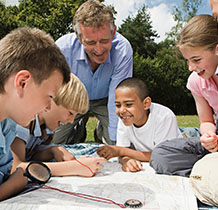Resource Database

Click on a topic or use the search box below to look for a listing:
There are 488 resources. Displaying 10 resources per page.
Youth must learn how to express their emotions with words, especially when they encounter conflict. The Harvard Graduate School of Education has created a blog post describing emotional regulation strategies educators can promote with their students. One example is having students use “I” messages to describe their feelings.
View Resource
Do you want to learn more about social and emotional learning (SEL)? The Wallace Foundation has produced a podcast with three episodes dedicated to the “what,” “how,” and “why” of SEL. Learn about what makes for high-quality SEL and about the intersection of SEL and equity.
View Resource
Understanding child development will help you and your afterschool team better engage with youth. Y4Y has developed a course that addresses the stages of child and adolescent development. The course provides strategies for building relationships with children and families and has resources for training afterschool staff on the topic.
View Resource
Diverse Learners
When it comes to the arts, there is a participation gap between Black Americans and people of other racial backgrounds. A new study from the Wallace Foundation aims to understand more fully Black Americans’ relationship with arts and culture and how arts organizations can better serve Black Americans. It recognized that Black and African Americans value arts organizations and spaces that celebrate Black creativity, support self-care, commit to earning Black communities’ trust, and foster a sense of belonging among Black communities.
View Resource
Diverse Learners
Studies show an increasing gap in access to OST programming for youth from middle-class and working-class backgrounds. Many youths from marginalized communities are treated differently by expanded learning professionals due to their racial or gender identity, or they cannot participate in OST programming because of other responsibilities. Two new studies from the Wallace Foundation examine these issues and provide recommendations on how to better support racially minoritized and marginalized youth.
View Resource
Diverse Learners
Marginalized communities continue to experience horrifying events related to systemic racism, discrimination, and inequities. It remains crucial that afterschool programs provide inclusive program spaces, equity-centered activities, and an introduction to antiracism. These events have led the National AfterSchool Association to revise the NAA Core Knowledge and Competencies (CKCs) for Afterschool and Youth Development professionals with a focus on equity and culturally responsive practices. These updated CKCs, include a new content area and additional and streamlined knowledge, skills, and competencies, explicitly indicating the vital role equity, inclusion, access, and antiracism play in afterschool work.
View Resource
Diverse Learners
Do you want to become more fiscally responsible with your 21st CCLC program’s resources? Y4Y has several fiscal management tools and resources to help build and sustain a 21st CCLC program. Resources include a budget-development checklist and an FAQ that answers common questions about keeping inventory records in the 21st CCLC grant program.
View Resource
Program Management
Many afterschool programs face an urgent need to attract, select, and retain high-quality staff. But how does a program find potential team members? How does a program continue to support its current exceptional staff? The Afterschool Alliance hosted a webinar answering important staffing questions such as these and providing strategies to recruit, hire, and retain program staff.
View Resource
Program Management
For youth to thrive, our afterschool workforce also needs to thrive. Afterschool leaders can make this happen by ensuring that staff have access to living wages, good benefits, and a positive work environment. The National AfterSchool Association has written an article defining job quality and describing how to create quality afterschool jobs. The article provides suggestions that can lead to better outcomes for staff who help youth to thrive.
View Resource
Program Management
The COVID-19 pandemic has severely impacted young people as it has caused school closures and less access to out-of-school time (OST) programming. As a result, students have missed opportunities to build social skills, life skills, and other habits essential to promoting their wellbeing. A recent report from Afterschool Alliance shows that afterschool programs address these gaps. Additionally, findings explain that parents overwhelmingly support afterschool programs, with 81% saying afterschool programs help build children’s confidence and 82% saying the programs help children learn life skills.
View Resource
Program Management
There are 488 resources. Displaying 10 items per page.
- Academic Enrichment
- Afterschool Enrichment
- Classroom Management
- College and Career Readiness
- Diverse Learners
- Family and Community Engagement
- Program Management
- Social-Emotional Learning
- Sustainability
- Technology
Subscribe to the Illinois Quality Afterschool newsletter and resource bulletin.
